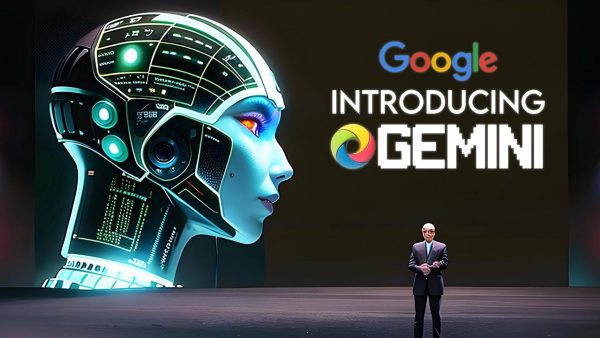
Google unveils Gemini, its AI model capable of competing with GPT 4
Table of Contents
ToggleGoogle has marked a significant milestone in its AI journey with the introduction of Gemini 1.0, the latest pinnacle of its AI model development.
Unveiling Gemini
Google Bard, the company’s generative AI chatbot and competitor to ChatGPT, is set to undergo a transformation with the integration of Gemini. Google assures that this upgrade will substantially enhance Bard’s capabilities. Sundar Pichai, Google’s CEO, has labeled it as the “most extensive science and engineering efforts we’ve undertaken as a company.”
Gemini is touted by Google as “natively multimodal” since its training encompasses images, video, and audio, not just text.
Google’s Demonstrations
During demonstrations, Google researchers showcased Gemini’s potential in supporting scientific research by answering questions related to a research report that included graphs and mathematics. Gemini demonstrated its ability to analyze a photo of an arithmetic assignment, distinguishing between correct and incorrect answers.
Alphabet, Google’s parent company, has revealed plans to develop three versions of Gemini, each varying in computing power. The Ultra version, designed for data centers, is set to launch in early 2024. The Pro variant, a medium-sized option deemed the most capable all-purpose device, is currently powering Bard. The smallest version, Nano, is optimized for efficient operation on mobile devices.
Availability of Google Gemini
Gemini, Pro, and Nano were globally released in 170 countries on a Wednesday. Google made Gemini Nano available for its Pixel 8, with the Pixel 8 Pro being the first phone to support Nano. This support brings about new capabilities, such as an app for summarizing recordings and Smart Reply for WhatsApp. In early 2024, Google plans to release “Bard Advanced,” featuring Gemini Ultra, the most powerful iteration.
Gemini vs. ChatGPT
According to Google, the “Ultra” version of Gemini surpasses ChatGPT in performance. Test results indicate that Gemini Ultra outperformed the OpenAI model in 30 out of 32 areas. The most proficient Gemini version excelled in multiple-choice examinations, grade-school math, and other benchmarks, surpassing GPT-4. However, a white paper released on Wednesday acknowledged persistent challenges in developing AI models to acquire higher-level reasoning skills.
Demis Hassabis, CEO and Co-Founder of Google DeepMind, shared in a blog post that Gemini excels in various linguistic tasks, surpassing human performance. He highlighted Gemini Ultra’s achievement in outperforming human experts with a score of 90.0% on MMLU (massive multitask language understanding), covering 57 subjects such as math, physics, history, law, medicine, and ethics, testing both world knowledge and problem-solving abilities.
Frequently asked questions (FAQs) about Google’s Gemini AI:
1. What is Google Gemini?
Google Gemini is the latest advancement in Google’s AI journey, represented by the release of Gemini 1.0. It is a sophisticated AI model designed to enhance various applications, including the transformation of the Google Bard chatbot.
2. How does Gemini differ from previous AI models?
Gemini is described as “natively multimodal” because it is trained on images, video, and audio, offering a more comprehensive understanding than models trained solely on text. This allows Gemini to excel in various tasks, including supporting scientific research.
3. What versions of Gemini are being developed by Alphabet?
Alphabet, Google’s parent company, is developing three versions of Gemini. The Ultra version, intended for data centers, is set to launch in early 2024. The Pro variant is a medium-sized, all-purpose device currently powering Bard, and the smallest version, Nano, is optimized for efficient operation on mobile devices.
4. When and where is Google Gemini available?
Gemini, Pro, and Nano were released globally in 170 countries. Google made Gemini Nano available for the Pixel 8, with the Pixel 8 Pro being the first phone to support Nano. More capabilities, such as a “Summarise in the Recorder” app and Smart Reply for WhatsApp, are now accessible.
5. How does Gemini contribute to scientific research?
Demonstrations by Google researchers showed Gemini’s potential in aiding scientific research. It can answer questions related to research reports that include graphs and mathematics. Gemini showcased its ability to analyze images, such as a photo of an arithmetic assignment, to determine correct and incorrect answers.
6. How does Gemini compare to ChatGPT?
According to Google, the “Ultra” version of Gemini outperforms ChatGPT. Test results indicated that Gemini Ultra surpassed the OpenAI model in 30 out of 32 areas, excelling in multiple-choice examinations, grade-school math, and other benchmarks. However, challenges in developing higher-level reasoning skills were acknowledged in a white paper.
7. What linguistic tasks does Gemini excel in, according to Demis Hassabis?
Demis Hassabis, CEO and Co-Founder of Google DeepMind, stated in a blog post that Gemini excels in various linguistic tasks, surpassing human performance. Gemini Ultra achieved a score of 90.0% on MMLU (massive multitask language understanding), covering 57 subjects such as math, physics, history, law, medicine, and ethics, testing both world knowledge and problem-solving abilities.
8. When can we expect the release of “Bard Advanced” with Gemini Ultra?
Google plans to release “Bard Advanced” featuring Gemini Ultra, its most powerful iteration, in early 2024. This release is anticipated to bring advanced capabilities to the Google Bard chatbot.

Leave a Reply